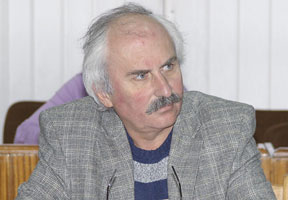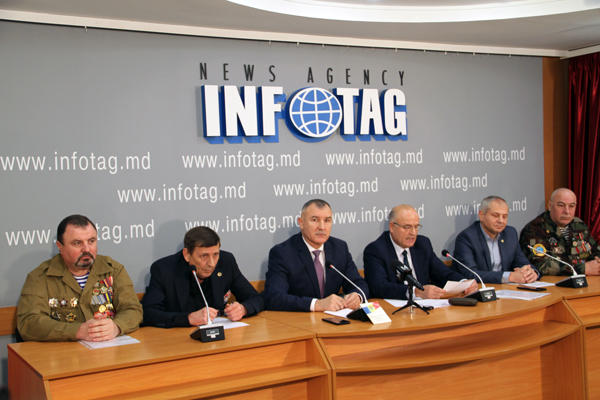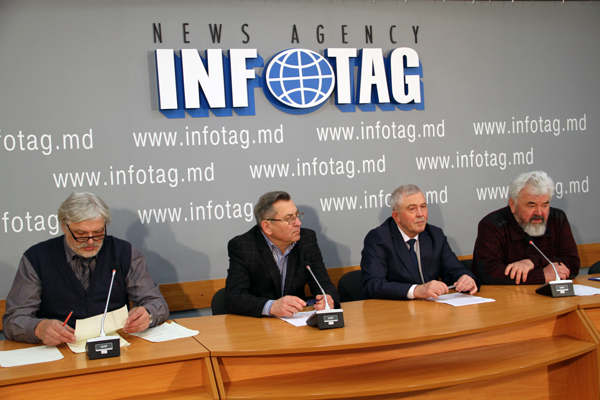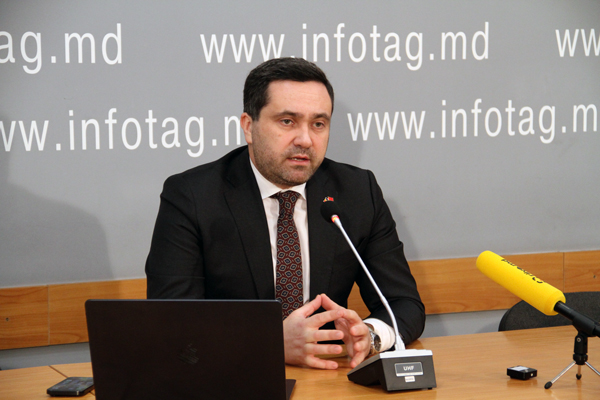Interview
THE LIVE DNIESTER: FROM RIVER HEAD TO ESTUARY!

(Infotag’s exclusive interview with Director of the Eco-Tiras International Association of Dniester River Keepers, Doctor of Biology Ilya Trombitchi.
Part 1 of 3. Kiev’s position is based on “clouding public’s eyes” by means of endless monitoring and researches.
Question: Mr. Trombitchi, how do you regard the possible privatization of the Dniester hydroelectric power station?
Answer: By means of the station privatization an additional source of potential inconsistencies in hydropower unit in general is being formed. It should be administrated by one person, but not as it is done now – each object has its own manager, interested in profit of only his object. Some negative moments of influence on Dniester may have long been removed by means of ensuring a more coordinated work of the entire hydroelectric unit given the interests of ecosystems, located downstream. What we are witnessing now and expect in future is a well-organized mess, which no way contributed either to the international cooperation on the river or its keeping.
Q: The interest in raising the privatization attractiveness of Dniester hydroelectric station forced Ukraine to activate negotiations on Dniester hydro-energy complex, Negotiations are conducted since 2008, should Moldova accelerate today?
A: Objectively, Moldova cannot have any interest in concluding an agreement on hydroelectric unit, as with the current Ukraine’s approach to this issue, one can hardly expect from this document a considerable improvement of the situation with influence on the downstream Dniester. Besides, a trend is registered on withdrawing from the document text of provisions that regulate concrete parameters of water flow, which equally unprofitable for the Odessa oblast.
Meanwhile, this agreement the two prime ministers are planning to sign already this year, is the single bilateral document, in which mandatory hydrological parameters Moldova and Odessa oblast of Ukraine are vitally interested in may be regulated. The references on the Agreement on Dniester as potential regulating mechanism for the hydro-engineering complex are irrelevant from the legal point of view, as the very agreement does not include such priorities. Back at the stage of its development, the Ukrainian side insisted that the hydropower sector will be regulated by a special agreement. In this situation, it is very important the adherence to principle in the Moldovan Government’s position and understanding of the fact that they defend not only the interest of Moldova, but also that part of Ukraine, which is located downstream, and first of all the Dniester ecosystems, as on their condition depends the future of all the people, who are living in the basin of this river.
Q: According to Chisinau version, the article #6 of the Agreement sounds as follows: “For control and assessment of water resources quality, the nature protecting bodies, empowered by the sides, undertake to conduct joint monitoring of ecological, including hydrological, hydro-biological, hydro-chemical condition of the Dniester River at the section of buffer hydro unit near Naslavcea village”. In this connection, the question is which are the red lines for Moldovan negotiators from the position of Dniester River keepers?
A: In fact, Chisinau demands include concrete parameters of water discharge the Ukrainian side should ensure. With all this, currently these are not formulated well enough and the reason for this is the behind-the-scene character of decision-making process, when instead of wide discussion of specialists, the process brings together people due to their post. That is there is a considerable field for working on the position of the Moldovan side. It is important not the very fact of conducting joint monitoring, though of course it demonstrates the sides’ desire to implement joint activities in the Dniester basin. Much more important is the understanding that this is not an end in itself, but the opportunity to understand problems and demands of the river to establish such water discharge parameters that will allow the river to normally function.
We are permanently proposed to replace the establishing of clear parameters of hydropower unit functioning with monitoring and researches. Of course, all this is necessary, but the research alone cannot reduce negative consequences of impact. This is rather a clouding of eyes, when the active part of scientists and specialists are assigned with activities that imitate the measures for situation improvement. Moreover, according to the results of the Prime Ministers’ meeting in February 2017, a bilateral commission should be created with attracting international experts for European money for assessing the Dniester basin from the river head to its estuary. We regard this as clouding of eyes also, because the set tasks should be fulfilled by the Dniester river commission, which will soon be created in accordance with the 2012 Agreement.
Q: As for territorial factor. Ukraine is trying to get a large part of Moldovan territory at its disposal. What do you think about this?
A: I heard nothing about a large part of the territory. As long as I know, it is about long-term rent of Moldovan territory with an area smaller than 20 hectares. It includes the section that is adjacent to the 2nd hydroelectric power station and a narrow strip of Moldovan right bank of buffer water reservoir till the border with Ukraine. I do not see problem with the rent of the territory at the station dam, but in what concerns the rent of the riverbank, here I disagree, as its factual goal is to cut Moldova off the access to water, but not the declared reason – water level raising. There is no need of rent for flooding this territory. Here, Dniester has a rocky steep bank and it does not need strengthening. While the access to water may be necessary for Moldova in perspective, in case Ukraine does not fulfill liabilities on ensuring the necessary water discharge from the Dniester water reservoir.
Part 2 of 3. Further destiny of the Dniester River in Ukraine and Moldova hands
Question: Both countries signed the Association Agreement with the EU, which implies correspondence with EU standards, including in the field of environment. May the European experience be used by Moldova and Ukraine for river enhancement?
Answer: Of course it may! Moreover, all the activities of the Eco-Tiras NGOs are directed to contribution to the implementation of principle of integrated administration of this cross-border river basin namely on the basis of European approach. All the more that the very EU Water Framework Directive demands from countries, which aspire to join the EU, not only formal legislation harmonization with the European norms, but also concrete actions, directed to cross-border water resources management. This is not only the concluding of basin agreement, but also development and implementation of the supranational plan of Dniester basin administration.
Moldova has adopted such a plan, but it concerns only the Moldovan part of the basin. Equivalent actions are taken by the Ukrainian side, but we see no joint initiatives, directed to resolving of problems of the entire basin, so far. Of course, it is done by means of different mechanisms – periodic basin conferences, to which all the interested parties are invited. The 8th such conference will be conducted in Tiraspol in October. However, the success may be guaranteed not by the adoption of different laws, but by their real implementation. In this sphere both countries have big problems. On the other hand, we see that the EU is not uniform. The lobbying of large businesses’ interests, including in energy sphere, is a sad reality there.
Geopolitics has a great role in the region. Europeans have a phobia of remaining without energy sources. In this field, Ukraine and Moldova are regarded as gray zone, where European laws are not functional and thus the Dniester River destiny is not very important. However, the Dniester basin as a potential source of energy represents interest for them, even with ethic and ecologic costs.
Thus, our address to the EU during the spring protests against the building of six new hydroelectric power stations in the upper course of Dniester was held under the slogan “EU – you become responsible for what you have tamed!”. Thus, the raising of technogenic burden on Dniester will lead to its transferring into the category of heavily modified water bodies, in accordance with the EU legislation. This is a category that is regarded as hopeless in the field of improving environment situation. Such situation will no way satisfy those 8 million of people, who live in the Dniester basin.
Unfortunately, the response of European political and financial institutions on our address has a character of formal reply and repeating of phrases from the EU-Ukraine Association Agreement and that the EU hopes that Ukraine will implement its provisions. We see no desire or political will to change the situation to better or influence on Ukraine’s plans in hydro-technical building in the river basin.
Q: Can one hope that the Association Agreement will become an efficient instrument for the EU against such Ukraine’s contradictory actions?
A: It is improbable, though it would be likely. Agreements with EU are different in the two countries, though are much alike. The main goal of the Agreement is not to oblige countries, but to contribute to their efforts, directed to integration, including in the sphere of administrating the cross-border water resources.
It seems to me that so far the EU has no idea what to do with Moldova and Ukraine and of course the problems of water policy and cooperation may not become the main reason for using financial mechanisms of Brussels’ pressure on Chisinau and Kiev. Unfortunately, governments of these countries do not understand other language.
Q: How do you think, may the civil society intervene in the process of Dniester fading?
A: The importance of the civil society on the situation in both countries has weakened due to the weakening of democratic mechanisms of decision adoption. These mechanisms were replaced with autocratic methods, based on oligarchy rule. Nevertheless, we do not give up and see our task in explaining to people the essence of the occurring processes and proposing optimal solutions.
I think, authorities already got tired of our addresses and letters. Our strong side is close cooperation and mutual informing inside the NGO association and other supporters on both sides of the border. We do not have discord in approaches, as we promote one philosophy, which puts at the top the preservation of the River and its ecosystems for future generations and taking into account of all the interested sides.
The role of the NGO should manifest in motivating the society to changing its position from passive observation to dynamic actions in supporting the river and the people who live on its banks. The understanding by the society of threats and their sources influences the electoral moods, especially in zones, affected by changes. The familiarization of international organizations and structures with the real state of things is also our goal. Thus, it is obvious that the authorities are forced to give us attention and somehow take into account the proposed variants. I will not go into details, but we have international levers of influence also.
Q: May the transmission of the Eastern Europe’s largest hydroelectric power station to become for Moldova the losing of control over the river?
A: It is about the hydroelectric pumped storage power plant, while I propose to regard the hydroelectric complex as a single whole, for which the Ukrainian state is responsible. Thus, the future depends much on how it will be developing and to what extent Ukraine will become a European and democratic country, liberated from oligarchy. However, we should not exempt Moldova and its Government from the responsibility for river destiny, as their position is also important in resolving the issues of energy and environment safety in the Dniester River basin and the behavior in current negotiations.
Q: The privatization may have accelerated the process of building the cascade plants, but in this case is there no risk that the station will become an instrument for manipulating both countries’ businesses?
A: I think that the privatization of the hydropower stations is a part of Ukrainian oligarchs’ business. As long as they actually control the country, of course it will become a part of mechanism of such manipulations, as it gives energy, which may be sold at a high price, presenting it as green energy. The categorizing of the hydroenergy as green energy and establishing of triple price for it is already manipulation, directed to legal taking away of money from the country population and at the same time the worsening of living conditions of this population.
Part 3 of 3. Ecosystem services is a common wealth, thus they should not be transformed into oligarchs’ dollars.
Q: For Moldova the Dniester is the single source of water supply. The approach to the river from the political point of view may deprive the country of this. What is this fraught with and which are your forecasts for the nearest future?
A: Objectively, three complex factors influence Dniester water resources. These are: hydraulic construction, climate change and using of land in the river basin, mostly in Carpathian Mountains.
Today, the third factor – the ability of mountain forests to accumulate water, in order to evenly ensure water flow later – is certainly underestimated. Thus, when the Dniester River Commission starts its work, we should insist on developing a bilateral plan of managing the river basin, in which each country will take certain liabilities, including on administrating the basin territory. First of all, these should be measures on suspending the cutting of Carpathian forests. This is why the Dniester agreement was concluded – to preserve the river – and should be used in full for this.
Q: According to the Agreement on Sustainable Development of the Dniester River, a joint river commission should have been established within 2 months. The deadline passed back in August, has the commission been created?
A: The counting out of two months starts with official notification by the last side, which ratified the Agreement (in our case it is Ukraine), about the fact of ratification. The agreement has entered into force on July 28, so there is still time for forming the river commission and, as long as I know, the Moldovan side proposed to Ukraine to agree on the approximate quantity structure of each category of representatives – the state, the science sector, the NGOs, the regional authorities.
Q: The Dniester is a living organism, it is not just a certain volume of water and biodiversity, rehabilitation of formerly important fish resources in terms of quality and diversity. What is being done and what should be done in this direction?
A: Yes, it is true. This is why the basin approach is adopted in the whole world. The subject of new Dniester Agreement is the entire river basin, while the planned activity that may influence the river, should be coordinated with another country. In this connection, Ukraine has clearly violated its liabilities, implied in the Protocol on Strategic Environmental Assessment (Kiev 2003), when it failed to inform Moldova about intentions to build six hydropower stations in the upstream.
We should be concerned about what will happen to the fish in this part of the Dniester? What will happen to the people, who lost lands due to the resettlement and flooding? What will happen to the Dniester canyon and other protected natural territories? What will happen to the Moldovan part of the basin and how this construction will influence Moldova’s economic, social and environmental safety? Governmental programs should not be approved in presence of such a big number of the unknown just for the sake of private interests of a handful of people, no matter that they are very rich and thus very important.
All of us are deprived of ecosystem services, which are common treasure and transform them into dollars for oligarchs. As long as this is happening, the situation cannot be cardinally changed to better. We come to a conclusion that there is a need of deep political changes in both countries, otherwise it is impossible to preserve the Dniester River.
Q: Which is the role of Transnistria in this situation?
A: We have always stressed that no matter the political interests, the cooperation in environment should continue and be filled with concrete contents, but not empty statements for future. Unfortunately, according to our observations, the Moldovan Government gave up on such an approach and is doing almost nothing. Besides, somehow the point of view prevailed that any cooperation with Transnistria should be done via the Bureau for Reintegration. We disagree with such an approach and try to involve the region’s NGOs and specialists in our activities as much as our funds allow.
Currently, the Eco-Tiras is implementing the UNDP-EU Confidence Building Project, within which we are establishing an environmental platform of cooperation between the two sides of the Dniester River with involvement of local authorities and NGOs. Both sides are highly interested in the platform. A number of joint projects will be implemented. Of course, Dniester and its problems are in the center of attention.
Besides, we together analyzed and identified perspective directions of cooperation for Dniester. We insisted that Transnistria representatives to be included in the Dniester River Commission according to the 2012 Agreement. I hope that the Moldovan Government will give a positive conclusion to this issue. Moreover, each year we are conducting Dniester youth summer schools with equal participation of young people from Moldova and Transnistria (35+35). Over 700 people participated in these schools over recent years. We are sure that these people will never shoot at each other, while becoming ministers, will adopt a careful approach to the river.
Q: In late October, international conference “Integrated Administration of Cross-Border Dniester Basin: Platform for Cooperation and Modern Challenges” will be held in Tiraspol. How many of recommendations and initiatives, proposed by experts at this international platform, will be heard and taken into account at decision making?
A: Yes, this conference, in which scientists, NGOs, specialists from the whole Dniester, as well as foreign specialists will participate, was supported by the OSCE and the German Ministry of Environment. All the Dniester problems are in the center of attention, but the most important topics are the building of hydropower stations and the condition of small rivers – Dniester affluents.
According to the registration and the materials we receive for publication, over 130 people will participate in it. I am sure that our conference’s recommendations and proposals will allow Moldovan and Ukrainian citizens to deeper understand the situation, while those officials who still have shame – to think well about the decisions they are taking and to stand in protection of people’s interests.
Q: Thank you for the interview!
























Add Comment